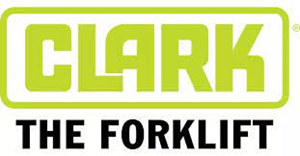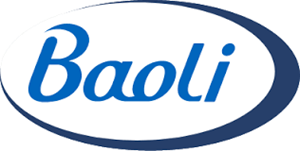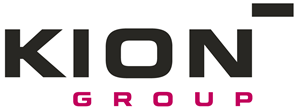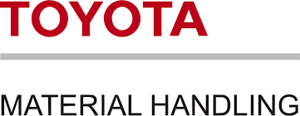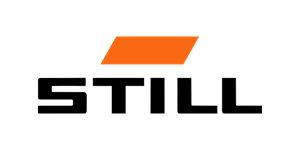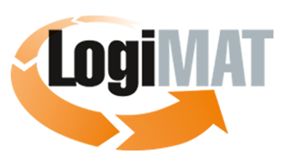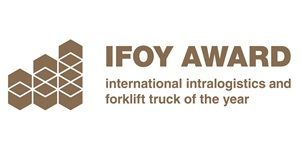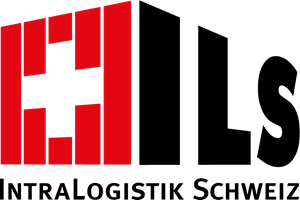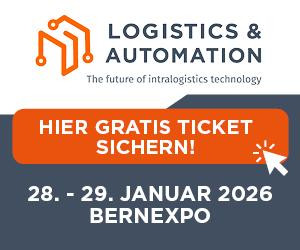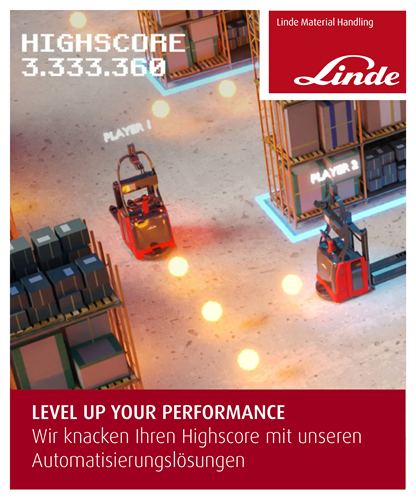WWW.LOGISTICSINNOVATION.ORG

The online magazine for Switzerland, the EU and the rest of the world
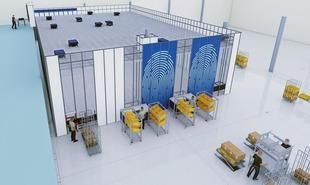
AutoStore for Belgian hospitals
November 22, 2025
AutoStore system for Maria Middelares, a non-profit medical organization in Belgium, and Aalter in East Flanders, about 60 km west of Brussels.
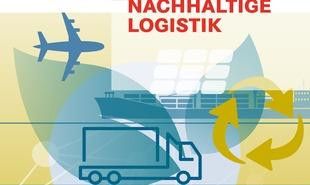
Reliable data instead of empty phrases.
November 21, 2025
The Basel Logistics Cluster of the Basel Chamber of Commerce (HKBB), together with the cantons of Basel-Stadt and Basel-Landschaft, industry associations, and infrastructure operators, has published a guide to sustainable logistics in the Basel region. Supply chain expert Daniel Bubendorf explains why such a guide is needed.
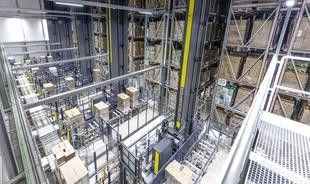
They were ahead in doubles with Exyz.
November 21, 2025
Equipped with double-deep load handling devices, six SSI Exyz storage and retrieval machines achieve up to 28 double cycles per hour in a six-aisle, 42-meter-high high-bay warehouse implemented at the Danish non-food retailer Schou . At peak times, up to 2,520 transport units per day can be processed.

Future Prize for Fuel Cell Trucks
November 20, 2025
A fuel cell system from Bosch, whose three developers Christoffer Uhr, Kai Weeber, and Pierre Andrieu were awarded the Future Prize for Technology and Innovation in Berlin on Wednesday evening , weighs around 4 tons less than a comparable battery-electric drive system. A decisive advantage.

All clear for exports?
November 20, 2025
The Swiss export sector has suffered greatly since August under the 39% tariff imposed by the US. Now the rate is to be reduced back to 15%. In return, at least US$200 billion in investments are expected to flow into the United States over the next few years.

AI control does not replace a sense of reality.
November 19, 2025
Those who spoke about peak load reduction, AI and intelligent battery systems in Cologne, in the presence of experts from Switzerland and the , had a good chance of success at the cold forum of the German Frozen Food Institute (dti) and the Association of German Cold Logistics Companies (VDKL).
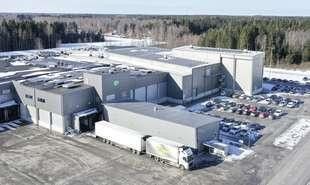
Shuttle technology for the fresh salad
November 17, 2025
There you have it – in the most modern salad factory in the northern hemisphere. Everything is perfectly organized in the highly automated storage solution that SSI Schäfer implemented for "Fresh Servant," the market leader in ready-to-eat vegetable mixes, in Edsevö, Finland. Even more than that.

Perfect landing in the parallel world
November 17, 2025
“Who among you has ever put an AGV into operation?” asks Christoph Hock, head of software at Linde MH, addressing the approximately 75 attendees – until a young consultant from Lugano volunteers. He is allowed to send the upgraded L-Matic into operation .
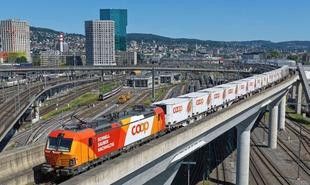
Coop delivers to Zurich by rail
November 12, 2025
Coop has opened a new rail transshipment hub in the heart of Zurich. The company now supplies the metropolis on the Limmat River by freight train, thus saving the urban center an estimated 58,000 truck journeys per year . A success for its own "Railcare" division.
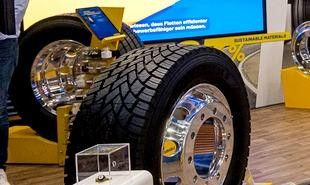
Reduce rolling resistance
November 12, 2025
Amidst the discussion about new drive systems, it's easy to forget that there are other vehicle components that also contribute significantly to reducing CO2 emissions. Tire manufacturer Goodyear offers up to 13% lower rolling resistance with its " Kmax Gen-3 " .
AI control does not replace a sense of reality.
WAGNER Switzerland AG
AI control does not replace a sense of reality.
November 19, 2025
Those who spoke about peak load reduction, AI and intelligent battery systems in Cologne, in the presence of experts from Switzerland and the , had a good chance of success at the cold forum of the German Frozen Food Institute (dti) and the Association of German Cold Logistics Companies (VDKL).
 S. Eichner. Photo: dti
S. Eichner. Photo: dti
Well-known names and protagonists from companies such as SSI Schäfer, gate manufacturer Efaflex, Swisslog, Kühne+Nagel, Nordfrost, measuring instrument provider Testo and Wagner (fire protection) gathered under the direction of dti managing director Sabine Eichner and VDKL managing director Jan Peilnsteiner for the annual conference, which was attended by around 180 participants.
Cut peak loads
With his presentation on intelligent storage systems for the frozen food industry, Juan-Carlos Mejia Pinto, Development Manager at Huawei, moved directly to one of the topics currently at the heart of many cost-cutting considerations. For in the "northern canton," as Germany is often affectionately called in Switzerland, not only are electricity prices a key issue, but so too is the question of emissions. Up to 60 percent of the CO2 equivalent values in the refrigeration industry are attributable to electricity demand, which can be immense at times.
 PV configuration. Image: Huawei
PV configuration. Image: Huawei
Systems for "storing" and converting existing energy sources, which, according to the provider, have not yet been utilized to their full technical potential, are therefore a key advantage. Battery storage systems to absorb peak loads, which determine electricity prices, are, for Pinto, a crucial measure to relieve the burden on companies – quite apart from the not inconsiderable initial investment. However, so far only five percent of the industry has such "peak shaving" technology.
Even 33 percent is good.
Intelligent systems powered by various renewable sources don't necessarily have to cover the entire energy needs of a refrigeration company to operate efficiently. For example, even a one-third share of renewable energy can reduce peak loads so significantly that a battery storage system using photovoltaics, with purchase prices that can quickly reach €1.5 million, would theoretically pay for itself "after just 4.96 years.
 J.-C. Mejia Pinto
J.-C. Mejia Pinto
The environment of intelligent control systems, the monitoring of such systems, and the potential for profitable switching states offer ample opportunities for "artificial intelligence," which naturally also relies on reliable data. Providing temperature readings using data loggers almost sounds trivial.
Determining the core temperature
These methods have existed for a long time. However, the differences between measuring the surface temperature of goods and the actual "core temperature" of, for example, meat products, which quickly get lost in the "nirvana" of the expiration date, are also well known.

Measurement specialists like sales talent Christian Podeswa of the Black Forest-based device manufacturer Testo have taken the opportunity to expand their business field with an algorithm-controlled program that uses the comparative data of thousands of real differential measurements to determine the actual temperature inside a product with high accuracy .
The product simulation method
According to Podeswa, the so-called "product simulation measurement" – derived from empirical data and time-related environmental conditions – makes a valuable contribution to food safety without having to dismantle entire loads each time.

Tips for a realistic AI start, rather than having to venture into science fiction scenarios, are now being offered by a growing number of consulting firms, such as Christoph Hoffmann's "AI & Data" within the Conet Group. Well-known figures like Mario Traar from Supply Brain GmbH, a already recognized for winning the Best Product award at the recent LogiMAT trade fair , offer "data-driven solutions for the supply chain."
Important lessons learned
Predictive demand analyses and inventory levels required for specific seasons or events like " Black Friday " can be calculated in advance using AI. Another question is whether AI- supported forecasts are worthwhile for smaller companies, or whether existing empirical data might suffice. Developing a complete "digital twin" is often only worthwhile for larger companies.
 Photos: klk.
Photos: klk.
Kühne+Nagel is one of them. IT manager Michael Lütjann and innovation manager Florian Seffert nonchalantly point to the massive database of the globally operating transport service provider, a veritable sea of data awaiting meaningful analysis and which has already enabled numerous use cases. "7,000 trailers are, after all, 7,000 data sources," says Lütjann. AI is, of course, no substitute for personal experience. "It's an extension of it," he says.
“We’re on it”
AI-controlled refrigeration systems are already 10 percent operational at KN. This is particularly evident in the optimized energy procurement on the electricity exchanges, the utilization of trailers using the "Transport Volume Estimator," and the admittedly extremely difficult but crucial "Short Term Demand Forecast" for logistics companies. However, even the latter can be better predicted using AI . Lütjann: "We're working on it."
 Valuable input: SVTL President M. Manzetti in Cologne.
Valuable input: SVTL President M. Manzetti in Cologne.
Swisslog, an automation provider known for its rapid response times in both standard and temperature-controlled could sometimes "produce hallucinations." Seffert and Lütjann pointed out that the results must, of course, be logical. Jan Peilnsteiner offered an optimistic perspective, noting that many companies had also benefited from unexpected results that hardly anyone had anticipated with such speed.
It's also advantageous, of course, if the framework set by politicians doesn't change overnight. Even AI-controlled systems can break down if the technology is ramped up and down too quickly.
Frozen food industry
in Germany
With a total turnover of over €22 billion, the frozen food industry is one of the most important sectors of the German food industry, supplying around 83 million people daily with fresh and frozen food and serving as a key supplier to retailers, restaurants, and catering services. VDKL and dti represent the industry's interests, provide essential background information and statistical data, and organize important events such as the joint Frozen Food Forum.
 VDKL Managing Director J. Peilnsteiner
VDKL Managing Director J. Peilnsteiner
The VDKL represents 231 companies with 494 operating locations throughout Germany. According to its own figures, the VDKL represents over 85% of the market in terms of available cold storage capacity for service providers in Germany . Its members have a storage capacity of 3.5 million Euro pallets and generate a total revenue of €14 billion.
The German Frozen Food Institute (dti), founded in 1956 as the "Working Group German Frozen Food Chain" , represents over 150 predominantly medium-sized companies from all parts of the temperature-controlled supply chain as its leading association.
